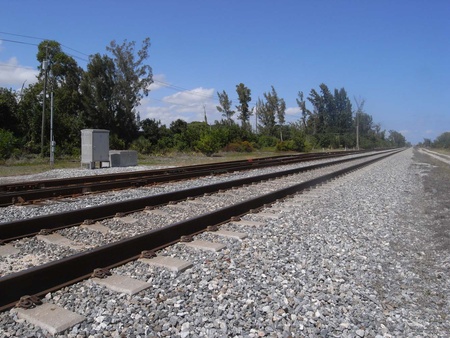Morikami Sukeji, who traveled to the United States as a member of the Yamato Colony in South Florida and remained there alone until the end of his life after the colony was dissolved, continued to write letters to his sister-in-law and her family after the war. Always thinking of his hometown, he devoted himself to farm work. He heard people say to him, "What's the point of working so hard when you don't have a wife or children? You're an idiot," but he told himself, "There's still work to be done."
* * * * *
Date: XX/1952
Mi-san, the woman you helped find, Itoko Kusuda, is now Shizuka Mori. She was suffering from the same illness as you, and lost everything during the war. Not only did her two children burn to death in an earthquake (the Kitatango earthquake of March 7, 1927), but her husband also died five years ago from the same illness, so she was forced to live in the care of her son.
In my hometown of Takiuma (Miyazu City), there is a woman in a similar situation. She became a widow at a young age and raised her only son with great difficulty. She was a brilliant young woman who was accepted into a university in Tokyo, but she passed away due to illness, and now she is spending the rest of her life alone in her hometown. (Note: This is likely a reference to Onizawa Hatsu, the woman to whom Sukeji proposed marriage before moving to the United States. The unrequited love at that time was also a trigger for Sukeji to move to the United States.)
<Don't complain or grumble>
Date: XX/1952
Mi-san, I worked in the fields for the first time in a while today. There are no crops, but I spent the whole day plowing the fields that had been devastated by drought and strong winds with a tractor. Even though I'm sick, I don't think about good things when I play around for a long time. I feel like a real human being now because I worked.
The drought that lasted for several months has finally ended, and the rain that started falling in the evening is still drizzling. Last year, it started raining in the fall and continued for nearly three weeks. All the seedlings I had planted in the north were destroyed, a huge loss. I'm fed up now. This year, I didn't plant a single one.
This year has seen many natural disasters all over the country, including floods in California and now storms and floods in the northwestern part of the country, killing hundreds.
Even though we are doing it for our country, compared to the many young people who perish on the battlefield, or the many who die tragically in plane crashes, train overturns, and car accidents, I think we should be very grateful to the world, rather than complaining or regretting that we don't have money or that things aren't going the way we want them to.
Yesterday, I received a letter from Yamauchi-kun (a friend from my hometown who lives in Miami). He has been working hard lately. He asked me to come visit him. His wife said she would treat him to her famous vinegared rice rolls.
I helped a friend who lives in town with his farm. It was a vacant lot behind a house, and I used a tractor to level it. He said he was going to plant watermelons. The friend is a distributor of the Miami Herald, Florida's top newspaper. He gave me a year's subscription fee (21 dollars) as a thank you. There are about 20 to 30 Japanese people in Miami. Most of them have families, but very few have children.
They run a nursery, a Japanese goods store, and a restaurant, and are all quite successful. A few of them are said to be returning to their home countries around next month. It seems that as people get older, they start to miss their hometowns. This is human nature, I guess. I would like to finish up as soon as possible, but it's not going as easily as I would like. If that's the case,
GEO
<Tears from a letter of kind words>
Dear Mi-san,
Sunday was Father's Day. I received a letter from Yamauchi in Miami asking me to come over and treat him, but I couldn't make it due to schedule. I will send you the cookbook you requested as soon as I find a suitable one. I will send you $50 with today's money order. It's a small amount, so please be patient for now. If I can sell the land, I can send more. My cat gave birth to three kittens. Now there are seven, and they are quite lively. Please be careful not to get sick.
GEO
Beauty
Thank you for your prompt reply. I read your kind words over and over again and could not help but tear up.
I can't help but feel as though I have suddenly gained a true sister. I felt lonely without anyone to really depend on. I feel a certain sense of responsibility. Humans need stimulation, especially those in my situation. My acquaintances and friends often tell me, "You're an idiot. What's the point of working like a slave? You've saved up a little money without a wife or children..."
That is certainly true. But they do not know my true aims and aspirations. I still have many projects to accomplish. It is only due to lack of funds that they are slow to progress.
"I hear the train going to Miami."
I'm extremely busy picking tometoh. The rain that started falling in the afternoon doesn't seem to be stopping anytime soon. Rain is a big no-no for tometoh, and this year's weather has been as bad as it has been for the first time.
It's 5 minutes before midnight now, and I can hear the train to Miami passing by. Midnight is around noon in my home country, and I'm sure everyone is busy preparing for lunch. I'll never forget the eggplant and cucumber pickles my mother made.
I still have the photos you sent me, and they weren't lost even during last summer's massive windstorm (150 miles per hour, the same as the typhoons that hit Japan).
If you have any photos you have taken recently, please send me one. I haven't taken any photos in 20 years, so I can't send you any. That's all.

Date: XX/1952
<A Japanese magazine for the first time in 11 years>
Dear Mi-san, I received your letter last night while you were away. It seems that Mikio-san (Mi-san's son, Suketsugu's nephew) was seriously injured, but fortunately he only suffered minor bleeding. I was also violent and careless as a boy, stealing ripe persimmons, falling from a tree I was climbing and breaking my arm, and being very competitive, I jumped into a rapids from a high bridge and drowned.
Cycling at night without lights is strictly prohibited in this country, and every year hundreds of people are killed or seriously injured after being hit by cars. Most of them are boys under the age of 20.
I read Japanese magazines for the first time in 11 years. Chuokoron, Kaizo, Fuji, King, etc. My home country is very different from what I imagined it to be. I can only be surprised at how much it has changed. Nothing has changed here. I am fine too. I'm in a good mood.
GEO
November 6, 1952
Beauty
It's been a long time. Due to the rain that has been falling for a month and a half, the work in the fields has piled up and there is a shortage of manpower, so there is no time to rest. Yesterday was my birthday, but I worked all day until 7pm.
It has suddenly become cool in Florida, and it gets quite cold at night. It is just after 1:30 this morning, and the temperature is 65 degrees (about 18 degrees Celsius), but I think it will probably drop to 45 degrees (about 7 degrees Celsius) near the morning. I am sensitive to the cold, so I shiver when it drops to 50 degrees (10 degrees Celsius). I miss the scorching hot summers when the temperature is close to 100 degrees. I have been in great health recently, and have not caught a single cold.
It's great that a grave for Yoneji (the youngest brother of Suketsugu) has been built. Wouldn't it be better to let Masahira (the younger brother of Suketsugu) cover all the costs? I fully understand your feelings, but if he says he will do it for his brother, I think it would be better to let him be happy about it.
The sweet potato import permit hasn't arrived yet. As soon as it arrives, I will send it directly to Takii. I'm feeling a bit sleepy again. There are still three hours until morning. I'll take a nap.
Morning of November 6th
(Notes in parentheses are author's notes.)
© 2019 Ryusuke Kawai






